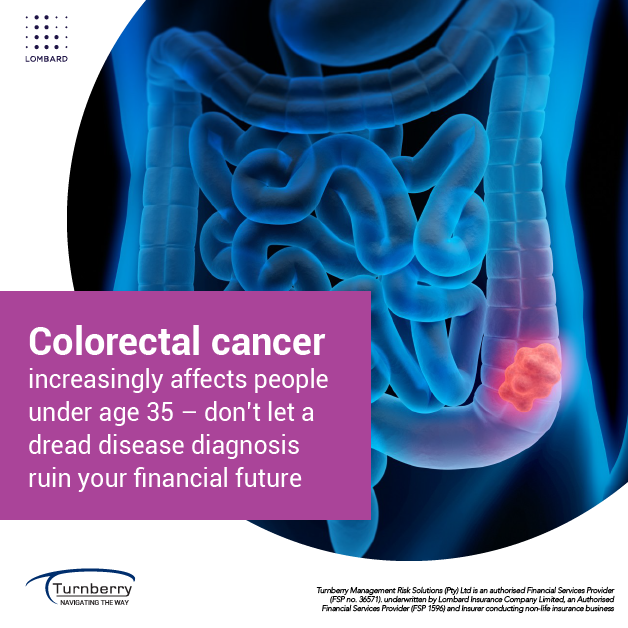
FA NEWS – 20th June 2022
We tend to think that cancer is something that mainly affects you as you get older, but the reality is that cancer is increasingly affecting younger people, and previously less common forms of cancer are becoming more and more prevalent.
For example, colorectal cancer numbers are rising, and millennials and Gen Z are twice as likely to have colon cancer and four times as likely to have rectal cancer. It was the tenth most common cancer in the 1990s and it is now the second most common cancer in men and the third most common in women. Youth is no longer a defence, and younger people need to ensure they have medical aid and gap cover in place to protect their financial future in the event of a dread disease diagnosis.
Numbers on the rise
In the 1990s, colorectal cancer was the tenth most common cancer across men and women. Now, it is the second most common cancer in men following prostate cancer and the third most common in women following breast and cervical cancer. According to the National Cancer Registry, one in 77 men and one in 32 women were diagnosed with colorectal cancer in 2019.
Statistics indicate that cases of this type of cancer are rising sharply in adults under the age of 35, which is typically before screening for colorectal cancer is recommended. As a result of this and the fact that symptoms can be vague, many diagnoses of colorectal cancer are only made in the late stages of the disease, which makes it much harder to treat and has a lower rate of positive outcomes.
Lifestyle may be to blame
One thing that may be contributing to the increase in colorectal cancer among younger adults is lifestyle. A sedentary lifestyle associated with office jobs and leisure time spent playing video games or watching television can be a significant risk factor. In addition, being overweight or obese, smoking, heavy alcohol use and low-fibre, high-fat diets, or diets high in processed meats, can increase your risk of colorectal cancer, as well as other types of cancer and chronic diseases. Other environmental factors like stress, as well as diseases like type 2 diabetes, and a family history of colon or rectal cancer or inflammatory bowel disease, also contribute to increased risk.
What to look out for
One of the challenges with colorectal cancers is that the symptoms are vague and non-specific and could easily be mistaken for other things or overlooked. Symptoms include blood in the stool, cramping, abdominal pain, diarrhoea or constipation, decreased appetite, fatigue, and weight loss. However, these may be caused by many other things, and are often chalked up to haemorrhoids, stress, anxiety, poor diet or Irritable Bowel Syndrome (IBS). This means that cancer is frequently overlooked, especially in younger people.
For those with a family history of bowel disease, it is advisable to have genetic testing and a colonoscopy. However, prevention is always better than cure, because the treatment for colorectal cancers is gruelling and often involves surgery as well as chemotherapy and radiation. Improving your diet, ensuring you have enough fibre by eating fruit, vegetables and whole grains, and making sure to follow a healthy lifestyle including exercise, are all key factors in preventing colorectal cancer and many other diseases.
When the worst happens
If a diagnosis of colorectal cancer is made, it is important to know that this is a Prescribed Minimum Benefit (PMB) condition, which means that treatment will be covered in full by medical aids if it meets the required conditions, and if you make use of a Designated Service Provider (DSP). However, if these conditions are not met, it is highly likely that you will experience medical expense shortfalls, particularly around surgeries and if new-generation biological cancer drugs are used. In addition, the workup required generally involves a colonoscopy, which always attracts some form of co-payment.
Gap cover can help to protect you from these shortfalls, covering the co-payment for colonoscopy as well as the medical expense shortfalls that may arise from surgery or making use of a non-DSP hospital or doctor. In addition, some gap covers offer additional benefits, such as a lump sum pay-out on first diagnosis of cancer, which can be used to cover day-to-day expenses while you are receiving treatment, as well as trauma counselling to help deal with the mental element of receiving a dread disease diagnosis.
Living a healthy lifestyle with a good diet and regular exercise is key in preventing disease, but sometimes this is not enough on its own. A cancer diagnosis is a life-changing event and the last thing you want to be worrying about is where you will find the money for treatment. Speak to your financial advisor about gap cover that fits your needs and your budget, to protect your financial wellbeing while you look after your physical and emotional health.
https://getcovered.turnberry.co.za/app/1
What is Gap Cover?

https://getcovered.turnberry.co.za/app/1
Client Testimonials
Turnberry assisted with claims for various incidents during the last few years – from an elective orthopaedic surgery for my young daughter to emergency surgeries for my wife. When my wife was diagnosed with cancer last year, the once-off payment assisted in a number of the out-of-hospital expenses. In addition, the knowledge that the expenses threshold is so much higher than the standard medical rates provided peace of mind. I have recommended Turnberry Gap Cover to our family, and reiterate that it is an essential or mandatory product. No healthy person believes critical or emergency procedures will happen. But the truth is that it can happen to anyone. The cost vs benefit is not a logical debate, without gap coverage you may end up selling assets to cover the bills. Turnberry’s services were professional, quick and efficient – ‘Peace of mind’. Mynhardt Oosthuizen – January 2022
